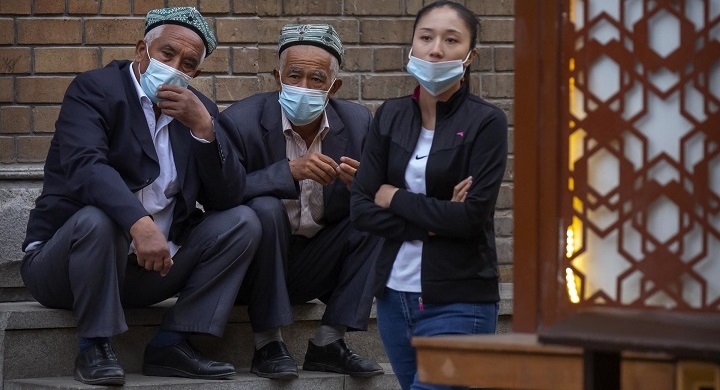
The issue of Xinjiang is a major controversy, pitting China against the Western media. Western media outlets claim that China is carrying out a genocide in Xinjiang, and China denies the allegations. Yet as time goes by, China’s counterclaims sound weaker and weaker, and despite all efforts to address this issue, China is caught in a bind.
The issue is actually very simple: China doesn’t guarantee free access to Xinjiang because it fears that journalists going there will be prejudiced against China and therefore their reporting will be unfair. On the other hand, the lack of free access to Xinjiang is taken by Western media as evidence of foul play by China in the region. Most importantly, the Chinese media’s lack of independence, their dependence on the state, and the lack of a free democratic political system where independent media can thrive are considered further evidence of something fishy going on in Xinjiang.
There is not actually much China can do or say at the present moment that can reverse the trend. In fact, the more China strives to tell its story, the more this story is taken as propaganda and therefore simply aggravates China’s position in the world.
Chinese media time and again say that China lacks huayuquan 话语权, the right to discourse or the capability to have its own voice[1]. And for decades it struggled with how to be heard in the Western world. This is not, however, an issue of “saying things”; it is a systemic issue[2]. That is, if you don’t have independent media in an independent democratic system, your words simply will not be believed. It is the ability to engage in free and open discussions within your country that lends credibility to your discourse.
It is the paradox of science expressed by the philosophers of science: science is believable and trusted, it looks rock solid, just because it is falsifiable, i.e. it is “weak”. That is, if there are greater proofs, the old theory can be dismissed and a new theory can take its place.
If discourse cannot be falsifiable and cannot be engaged in a full-fledged exchange of views, then it’s simply not science, but religion or superstitions of some sort. Of course the exchange has to happen with firm ground rules, thus it must not be dominated by the glib.
In this sense, China’s efforts to spread its voice in the world actually are counterproductive and proof to the world that China doesn’t want to tell the truth but only wants to spread lies. China needs to engage on a whole different level and engage the world as it is, not as it wishes it to be[3].
For all its mistakes, America recently scored some success. The most important public diplomacy accomplishment is its statement about freely distributing its own vaccine to the whole world. With this, the United States is finding again an alignment between its own national interests and the interests of the world that helped project its dominance after World War 2.
The United States believes that to have a full recovery and thus gain full recovery of its massive $4 trillion stimulus package, it needs to eradicate the epidemic from the world as soon as possible, because the USA can’t be isolated from the world and the world is its own “basin”. Therefore, it needs to get the whole world vaccinated as soon as possible. And the cost of free vaccination will be outweighed by the spread of an economic drive led by the United States. Therefore, the United States is recovering its clout around the world and it’s showing that the world and the United States are one.
This message is very different from that of China, which sells its vaccine to the world. Moreover, unlike the United States, China’s vaccine is not as effective and its population is far behind in being fully vaccinated. This is also part of the discourse, piled on top of the Xinjiang situation and all the other situations that may be controversial for China.
China doesn’t perceive it so because China thinks that it has contained the spread of Covid within its own borders, and it has imposed limits on people traveling to and from China. Therefore, in a way, the situation of Covid in the rest of the world is less important. But in thinking along these lines, China de facto closes itself off from the rest of the world and therefore concedes that the world is not its own perimeter. Conversely, the US by wanting to vaccinate the whole world claims that the whole world is its own “reserve”. The US therefore challenges China: either it joins the rest of the world according to American rules or it isolates itself from the rest of it.
Taiwan and important appointments
This falls back also on Taiwan, which is de facto part of the “American world” although de jure is part of One China. Chinese can’t win over the hearts and minds of the Taiwanese, yet reunification is important for China’s domestic rhetoric. This conundrum was managed as long as the US and China maintained a level of trust justifying strategic ambiguity. But as China-US trust is slipping, strategic ambiguity[4] is more difficult to maintain and thus, like a receding tide, the submerged conundrum is popping up with possibly devastating consequences.
All of this will impact on three important events in the next few months, each with different necessities for China. The first is the 100th anniversary of the foundation of the Communist Party. For that Beijing wants to keep everything under control. It needs nothing to go wrong. Supportive foreigners will be welcome, but they are not necessary—after all, it is a domestic party for the Party.
The second is the Winter Olympics, scheduled for February 2022. There is already the shadow of an international boycott and certainly controversies will grow in the next few months. As the 2008 Olympics was an international occasion to celebrate China’s successes, the 2022 games could become the occasion to pile all kinds of insults and humiliations on Beijing.
One choice will be extremely difficult: to invite or not invite foreign journalists. If Beijing opens its arms to them, the occasion could be to cover not just the games but Beijing’s true or alleged problems. If Beijing is restrictive in granting visas to foreigner reporters, all those excluded will pile bile on Beijing from abroad and the games will be really cold. There are no good choices here.
The third event is the most important and most delicate: the autumn 2022 Party Congress that should keep president Xi Jinping in place and possibly renew the appointments of the rest of the Standing Committee of the Politburo, essentially naming the new batch of people who will rule China for the next decade.
Perhaps, the Party will decide how to publicize it based on the results of the Winter Olympics. In any case, like American elections, this congress is extremely important for the whole world, not only for China. The public image of the congress is bound to be a message also on how the Party wants to present itself to the world and how it wants to take part in the management of the world or of its world. An open or very closed congress will send different messages to everybody and will have an impact on the ongoing “cold war” around China.
[1] See for instance https://www.scmp.com/comment/opinion/article/3101656/why-china-lacks-discourse-power
[2] This problem which is sensitive and important now emerged very early on and I analyzed the urgent necessity of China to address it in the book Another China, chapter 8
[3] See http://www.settimananews.it/informazione-internazionale/solid-air-and-the-power-of-love/
[4] See https://www.theepochtimes.com/the-future-of-strategic-ambiguity_3805627.html






From the Chinese perspective, if the Western media want to tell their citizens that the Earth is flat, that is OK for them. With the closing up of the economic strength between China and the West, the Chinese netizens believe the info battle is more in China than in the West, when the US and the West (plus Taiwan) step up last effort in propaganda to derail China. It is a legacy belief now that Chinese would try every effort to get endorsement from the West.
BTW, if the West launch a campaign to hold China hostage of the Winter Olympics 2022, Chinese would not care that any more. (Been there, done that. Chinese mature fast.)
The ¨”news” about the treatment of the Uyghurs mostly derives from US and finds very little traction in Muslim countries. And we all remember how all those “independent” Western media parroted US propaganda about the Iraqi weapons of Mass Destruction.
China is contributing more vaccines to the World than US. See this Indian article: https://www.indianpunchline.com/china-on-the-horizon-as-worlds-pharmacy/
Taiwan is a satellite of US and as such a military threat to China. But China expects US to get deeper into economic trouble ( see the articles by David Goldman in Asia Times ). With its more modern industries and superior infrastructure it can provide itself with the military and their weapons at lower costs than the US armed forces and be able to deter US aggression. Eventually Taiwan with its valuable electronics industry will return to China.
I found this part very misleading: “The most important public diplomacy accomplishment [of the United States] is its statement about freely distributing its own vaccine to the whole world. And the cost of free vaccination will be outweighed by the spread of an economic drive led by the United States. […] This message is very different from that of China, which sells its vaccine to the world. Moreover, unlike the United States, China’s vaccine is not as effective and its population is far behind in being fully vaccinated. This is also part of the discourse.”
Based on my research:
(1) China has supported the waiver of IP rights on COVID-19 vaccines alongside more than 100 countries already several months ago. On the other hand, the US along with the EU, Australia and other wealthy governments have stood in the way. In addition, US-based Pfizer even demanded embassies and military bases as a collateral from Brazil and Argentina. Pfizer’s demands went well beyond those of other vaccine companies, and beyond those of Covax, an organisation created to ensure low-income countries can access vaccines.
Sources:
https://msfaccess.org/sites/default/files/2020-11/COVID_Brief_WTO_WaiverProposal_ENG_v2_18Nov2020.pdf
https://www.hrw.org/news/2021/04/28/us-shouldnt-use-intellectual-property-claims-block-vaccine-access
https://www.thebureauinvestigates.com/stories/2021-02-23/held-to-ransom-pfizer-demands-governments-gamble-with-state-assets-to-secure-vaccine-deal
(2) The US has not accomplished anything yet. It reversed its stance only a week ago and has yet to take any concrete action. In addition, the waiver would be only temporary and the US plans to take measure to prevent any real know-how transfer to poorer countries.
Sources:
https://www.reuters.com/business/healthcare-pharmaceuticals/biden-says-plans-back-wto-waiver-vaccines-2021-05-05/
https://www.globaltimes.cn/page/202105/1222834.shtml
https://www.reuters.com/world/china/us-wants-covid-vaccine-patent-waiver-benefit-world-not-boost-china-biotech-2021-05-08/
https://www.bloomberg.com/news/articles/2021-05-06/the-world-turns-to-china-for-vaccines-after-india-u-s-stumble
(3) Meanwhile, China has already shipped out about 240 million doses, more than all other nations combined, has committed to providing another 500 million, and donated millions of doses (but when China donates doses is “vaccine nationalism”, when the US does – and so far has done very little – it’s labelled as “leadership”).
Sources:
https://www.bloomberg.com/news/articles/2021-05-06/the-world-turns-to-china-for-vaccines-after-india-u-s-stumble
http://www.xinhuanet.com/english/2021-03/30/c_139847278.htm
https://thediplomat.com/2021/03/the-logic-of-chinas-vaccine-diplomacy/
https://bridgebeijing.com/our-publications/our-publications-1/china-covid-19-vaccines-tracker/
(4) Apparently, the Chinese vaccines have been done their job properly so far:
* Sinovac Biotech’s [NASDAQ:SVA] vaccine is wiping out COVID-19 among health workers in Indonesia, an encouraging sign for the dozens of developing countries reliant on the Chinese shot, Bloomberg reported. Indonesian Health Minister Budi Gunadi Sadikin said that the southeast Asian country tracked 25,374 health workers in capital city Jakarta for 28 days after they received their second dose and found that the vaccine protected 100% of them from death and 96% from hospitalization as soon as seven days after.
* Positive data also came from the Brazilian town of Serrana, where nearly 100% of people studied were fully vaccinated, with serious illness and deaths dropping after they were inoculated, according to Nikkei Asian Review.
Sources:
https://www.bloomberg.com/news/articles/2021-05-11/china-s-sinovac-shot-found-highly-effective-in-real-world-study
https://asia.nikkei.com/Spotlight/Coronavirus/COVID-vaccines/Maskless-in-Brazil-Chinese-vaccine-creates-pandemic-oasis
Riccardo Ghia
Dear Riccardo M. Ghia thank you for your precision. However, the points you make are not uncontroversial, and as such further feed on the main thrust of my argument, which unfortunately I’ve been making for over 20years and is: China has little or no traction in the global debate. It can claim the world is not America and so forth, but in this, it presents more and more an alternative perception of reality like that of the Soviets during the Cold War and thus confirms the ongoing confrontation and feeds the anti- China hawks worldwide. The point really should be: how can Beijing wrest itself from this corner? not bickering over this or that detail. Thank you!
Francesco Sisci
“how can Beijing wrest itself from this corner?”
If your answer to that question is that Chinese media adopt Western “free” media stylings to better sell its side of the story (basically yet another iteration of your tired “China must bend the knee to Western hegemony or I won’t feel good” shtick), then it will lose that competition anyways. As your hand-waiving of Marcello’s comment demonstrates, an objective weighing of all the facts from all sides doesn’t actually matter, what matters whichever narrative you want to believe, and the strength of the media machinery that enforces it. Chinese authorities know this, and so care more about seeking the approval of their own citizens than hopelessly seeking to make Westerners feel better about them.